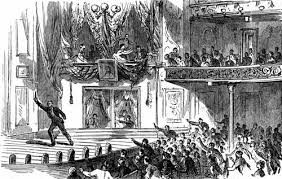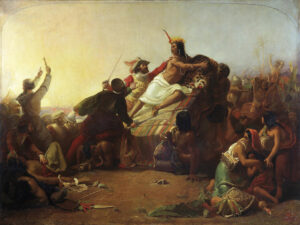Winner of the Fall 2016 StMU History Media Award for
Best Article in the Category of “United States History”
Post Civil War America showed the country as it never was before. Union and Confederate States, though reunited, still held grief directed toward one another. Most citizens just learned to adapt to the situation, but others choose to act out. An assassin will act as a vigilante by murdering a political figure in order to attempt to change the course of history. The first example of this in America was the assassination of President Abraham Lincoln and the attempted assassinations of Lincoln’s Cabinet by a group of vigilantes led by America’s first Presidential Assassin: John Wilkes Booth.1
John Wilkes Booth was born in May of 1836 into a family of actors, and was taught by his father Junius Brutus Booth. The Booth family traveled the country and performed for crowds. Booth was a handsome young man and a glorious actor. He often played the romantic hero’s of Shakespeare’s finest tragedies. Most notably he astounded audiences with his portrayal of Romeo in Shakespeare’s Romeo and Juliet. His good looks and charisma got him through most situations and made him irresistible to young women.2
As the Civil War began, tensions began to rise in the Booth family. John Wilkes Booth was alone in his hatred of the North, and often argued against his Union-loving family. He believed the cause of the Confederates was noble and that southern states’ rights were being ignored. Booth argued that Lincoln was a tyrant that wished to take everything away from the South.3 In 1859, Booth joined the Richmond, Virginia militia, and was assigned to be among one of the men who hung John Brown. Brown was the famous northern abolitionist who planned a slave insurrection and killed five slaveholding men.4 Although he carried deep pride for the Southern cause, Booth never joined the Confederate forces, but instead continued his acting career well into the Civil War.

In 1864, as the war continued, Booth materialized a plan to kidnap President Abraham Lincoln and hold him for ransom for the release of all Confederate prisoners of war.5 To pull this off Booth had to recruit a gang of fellow Confederate sympathizers, and after several meetings, Booth found his perfect team. The first to join his team was John Surratt, a Confederate agent and son of Mary Surratt who owned the Surratt Boarding House.6 The second was David Herold a Confederate sympathizer; the third was George Atzerodt, who was a German immigrant; the last was Lewis Powell, a prisoner of war from the Battle of Gettysburg.7
On March 17, after six months of plotting the kidnapping, Booth received word that Lincoln would be in their area attending a play at a local hospital.8 The men gathered their gear and laid in wait for their target to arrive. Booth set up a perimeter around a long stretch of road in an attempt to kidnap Lincoln en route to the hospital. After hours of waiting, Booth received new information that Lincoln had changed his plans to attend another event on the same day.9 Infuriated, Booth called his men back to the Surratt Boarding House and threw away any hopes of kidnapping Lincoln.
As the war came to an end and the Union victory loomed as inevitable, Booth and his conspirators became enraged and decided to escalate their plans.10 The group planned to destroy the United States government by assassinating President Lincoln, Vice President Andrew Johnson, and Secretary of State William H. Seward simultaneously. Each of the assassins was given a specific job; Powell would attack Seward in his hotel room, Atzerodt would assassinate Johnson, Herold would supply horses for the men’s escape, and Booth would take on Lincoln himself.11
The plan was set, and now the group only needed an opening. On April 14th, 1865, Booth received word from the manager of Ford’s Theatre, a place where Booth had acted previously, that President Lincoln would be attending that night’s show of Our American Cousin.12 Upon receiving the news, Booth began preparing his men for the night to come. Night fell, and the men headed out, each in the direction of their designated target.

Powell was guided to Seward’s house and when he arrived, he knocked at the door. The door was opened, and Powell pushed his way into the room where Seward laid, and stabbed him in the head multiple times. Powell saw Seward begin to bleed and he fled from the scene immediately. Fortunately for Seward he was wearing head-gear due to a carriage accident he had previously been involved in, and his life was spared. At the same time, Atzerodt headed towards the hotel where Andrew Johnson was staying. Atzerodt first headed to the hotel’s bar to settle his nerves, had a little too much to drink, ended up intoxicated, walked out of the hotel and gave up on the assassination.13 Lastly, Booth began his plot and entered Ford’s Theater armed with his single shot .44 derringer pistol and a large knife.14 Booth then snuck his way into the President’s box and found Lincoln, his wife, Mary Todd, accompanied by Major Henry Rathbone and Rathbone’s fiancee. Before anyone saw him, Booth slid his pistol out of his pocket and shot Lincoln in the back of the head. Major Rathbone jumped toward Booth, but Booth took out his knife and slashed at Rathbone.15

Once he was freed from Rathbone’s grip, Booth jumped from the President’s box, but as he fell, his leg got caught on a drape and as he landed he broke his leg. Pushing himself up, Booth screamed, “Sic Semper Tyrannis!” which means “Thus Always to Tyrants” and pushed his way to the alley where Booth’s horse was waiting, and he rode off into the night.16
- Salem Press Biographical Encyclopedia, January 2006, s.v. “John Wilkes Booth,” by R. Baird Shuman. ↵
- Salem Press Biographical Encyclopedia, January 2006, s.v. “John Wilkes Booth,” by R. Baird Shuman. ↵
- Salem Press Biographical Encyclopedia, January 2006, s.v. “John Wilkes Booth,” by R. Baird Shuman. ↵
- Arthur F. Loux, John Wilkes Booth : Day-by-Day (Jefferson, N.C.: McFarland & Company, Inc., Publishers, 2014), 35. ↵
- Salem Press Biographical Encyclopedia, January 2006, s.v. “John Wilkes Booth,” by R. Baird Shuman. ↵
- Loux, John Wilkes Booth: Day-by-Day, 166. ↵
- Elizabeth Leonard, Lincoln’s Avengers: Justice, Revenge, and Reunion after the Civil War (W. W. Norton & Company, 2005), 41. ↵
- Loux, John Wilkes Booth : Day-by-Day, 190. ↵
- Loux, John Wilkes Booth : Day-by-Day, 190. ↵
- Loux, John Wilkes Booth : Day-by-Day, 192. ↵
- Kathy Wilmore, “Wanted! The President’s Killer,” Junior Scholastic 117, no. 12 (April 20, 2015): 12. ↵
- Loux, John Wilkes Booth : Day-by-Day, 194. ↵
- Wilmore, “Wanted! The President’s Killer,” Junior Scholastic 117, no. 12 (April 20, 2015): 13. ↵
- Wilmore, “Wanted! The President’s Killer,” Junior Scholastic 117, no. 12 (April 20, 2015): 12. ↵
- Loux, John Wilkes Booth : Day-by-Day, 198. ↵
- Loux, John Wilkes Booth : Day-by-Day, 198. ↵



36 comments
Christopher Hohman
Nice article. The assassination of Abraham Lincoln was one of the great tragedies of American history. The newly reformed United States could have used Lincoln’s steady hand and calm demeanor in the coming reconstruction. It is ironic that by killing Lincoln the South kind of shot itself in the foot. Lincoln was not as angry with the South as other politicians were and would have made it easier for the South to rejoin the Union. I had no idea that John Wilkes Booth had originally planned to kidnap the president.
Shine Trabucco
This is really informative and detailed article. You use very detailed imagery and the story line is really great. Being able to follow this line it is important to develop for doing narrative fiction. I have heard this story before but the way you write is make the story interesting. Focusing on John wilkes Booth story is an interesting point of view
Gabriel Cohen
It was pretty awesome to get a more personal take on this historic event. I think generally people fixate on the overwhelming narrative of Lincoln’s death and its impact on the fragile Union. Giving true identities to those who have previously been one-dimensional is always a subject for a good story.
Edgar Velazquez Reynald
Great work. There’s information in here that I did not know about the assassination attempt. It’s fascinating that Booth was so anti-Union while the rest of his family was. I wonder where his staunch support of the Confederacy came from. I’m sure there’s plenty of research on this, but I also wonder if he had any connections/friends at the Ford theater that made his entrance so easy.
Sara Ramirez
This was a very informative and interesting article. I have of course heard of the assassination of President Lincoln, but never in this much detail. You told this story very well and included lots of little details that I had never before heard of, such as Booth’s cry of “Sic Semper Tyrannis!” after breaking his leg in the fall. Your story telling conjured vivid imagery and made me eager to read the second installation. Great job!
Danielle A. Garza
I really enjoyed the way you set up your climax. First you described your major characters and even though there was not a protagonist you were still able to pull it off. You then began to begin your rising action with each attempt of an assassination. Until it was time to talk about the assassination of Abraham Lincoln. I never knew about the others who accompanied him or that there was this larger plot ensuing.
Lindsey Wieck
Roberto, I really enjoyed reading both of your articles on this topic. The drama really comes through your storytelling. Great work! Both articles are now a required reading in my graduate Advanced Public History methods course.
Scott Sleeter
Excellent set up to the story of President Lincoln’s assassination. Most people recognize Booth as the assassin, but this does a great job of reminding us what a famous actor he was. This would be akin to someone like George Clooney shooting the President today. This must have had a very surreal feel to it when the news got out; being that the war had just ended, but now the President was dead at the hands of a very popular actor.
Mario Sosa
With so much hatred towards the Union, it would seem odd that John Wilkes Booth would pass up the opportunity of joining the Confederate army in the Civil War. What I’ve always wondered was how much security did Lincoln have in the theater? I would imagine not a lot if Booth was able to sneak his way in. Of course this was the first assassination of a president but there had been previous attempts on presidents before Lincoln.
Samire Adam
The facts presented in this article are all very interesting and I think even if I knew a lot about John Wilkes Booth and Lincoln’s assassination, I would still be surprised by reading this article. As for Booth, I am curious why he went against his parents values in supporting the Union? I would have thought that he spent a lot of time acting and touring with them he would grow into the same values. It’s unbelievable that if Booth were to grow into his parents values, one of the greatest presidents ever would have served a longer tenure.